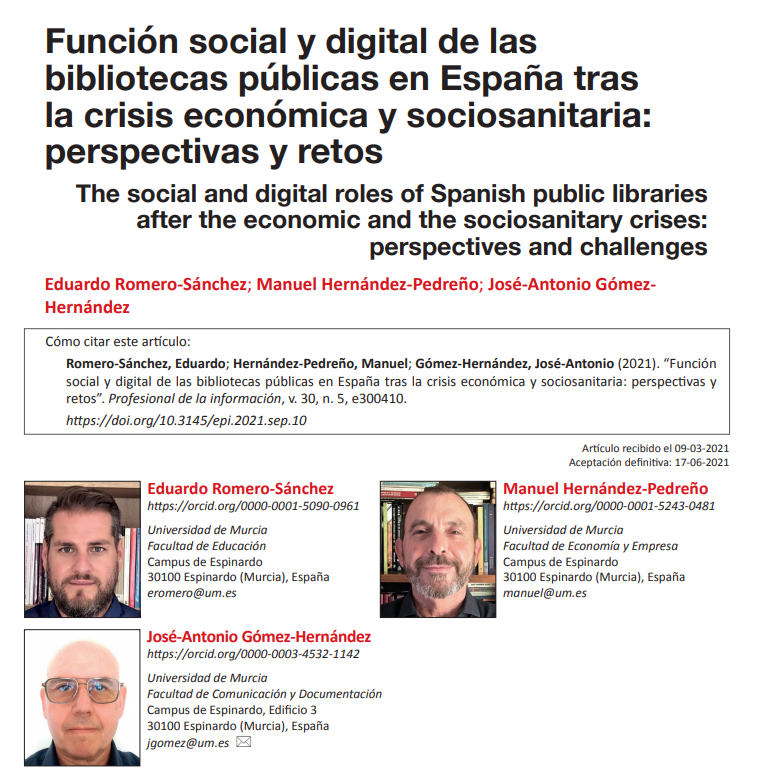
Función social y digital de las bibliotecas públicas en España tras la crisis económica y sociosanitaria: perspectivas y retos
On Sale
€15.00
€15.00
Resumen: Las sucesivas crisis –económica y sanitaria– que han enmarcado la década pasada han transformado la situación de las bibliotecas públicas españolas. El objetivo de este trabajo es identificar el impacto, las repercusiones y los retos tras estas crisis, y tratar de describir tanto el rol que deben cumplir las bibliotecas públicas a partir de este momento como las principales necesidades formativas y organizativas y servicios que deben prestar. La metodología aplicada es mixta, pues se desarrollan varias técnicas cualitativas de investigación como la entrevista a expertos y los grupos de discusión con profesionales bibliotecarios, junto a la revisión documental y de buenas prácticas. Los resultados muestran cómo la acumulación de efectos negativos ha generado impactos muy diversos, condicionados por factores como el tamaño del municipio, el grado de apoyo institucional o el perfil laboral del personal bibliotecario. Se ha puesto en valor la función social de la biblioteca, así como la labor de inclusión y formación digital, que tras la pandemia se concibe de formaunitaria. Asimismo, se evidencia un aumento de la brecha entre las distintas bibliotecas porque las formas de respuesta a las crisis dependen del contexto por la ausencia de políticas autonómicas o nacionales que apoyen y armonicen la prestación de los servicios mínimos o una formación básica de los profesionales. Se concluye con la necesidad de articular un modelo de biblioteca pública acorde a las demandas actuales de la sociedad y sus procesos de transformación digital.
Abstract: The successive economic and health crises that have marked the past decade have transformed the situation of Spanish public libraries. The objective of this work is to identify the impact, repercussions, and challenges after these crises and to try to describe both the role that public libraries must fulfill from this moment on, as well as the main training, organizational, and service needs that they must address. The applied methodology is mixed, applying several qualitative research techniques such as interviews with experts and discussion groups with library professionals together with a review of documents and good practices. The results reveal how the accumulation of negative effects has generated very diverse impacts, depending on various factors such as the size of the municipality, the degree of institutional support, or the job profiles of library staff. The social function of the library has been valued, as well as the work of inclusion and digital training, which after the pandemic is conceived in a unitary way. Likewise, there is an increase in the gap between libraries because the forms of response to crises depend on their context due to the absence of regional or national policies that support and harmonize the provision of minimum services or basic professional training. It is concluded that there is a need to articulate a new model of public libraries according to the current requirements of society and the general digital transformation.
Abstract: The successive economic and health crises that have marked the past decade have transformed the situation of Spanish public libraries. The objective of this work is to identify the impact, repercussions, and challenges after these crises and to try to describe both the role that public libraries must fulfill from this moment on, as well as the main training, organizational, and service needs that they must address. The applied methodology is mixed, applying several qualitative research techniques such as interviews with experts and discussion groups with library professionals together with a review of documents and good practices. The results reveal how the accumulation of negative effects has generated very diverse impacts, depending on various factors such as the size of the municipality, the degree of institutional support, or the job profiles of library staff. The social function of the library has been valued, as well as the work of inclusion and digital training, which after the pandemic is conceived in a unitary way. Likewise, there is an increase in the gap between libraries because the forms of response to crises depend on their context due to the absence of regional or national policies that support and harmonize the provision of minimum services or basic professional training. It is concluded that there is a need to articulate a new model of public libraries according to the current requirements of society and the general digital transformation.
